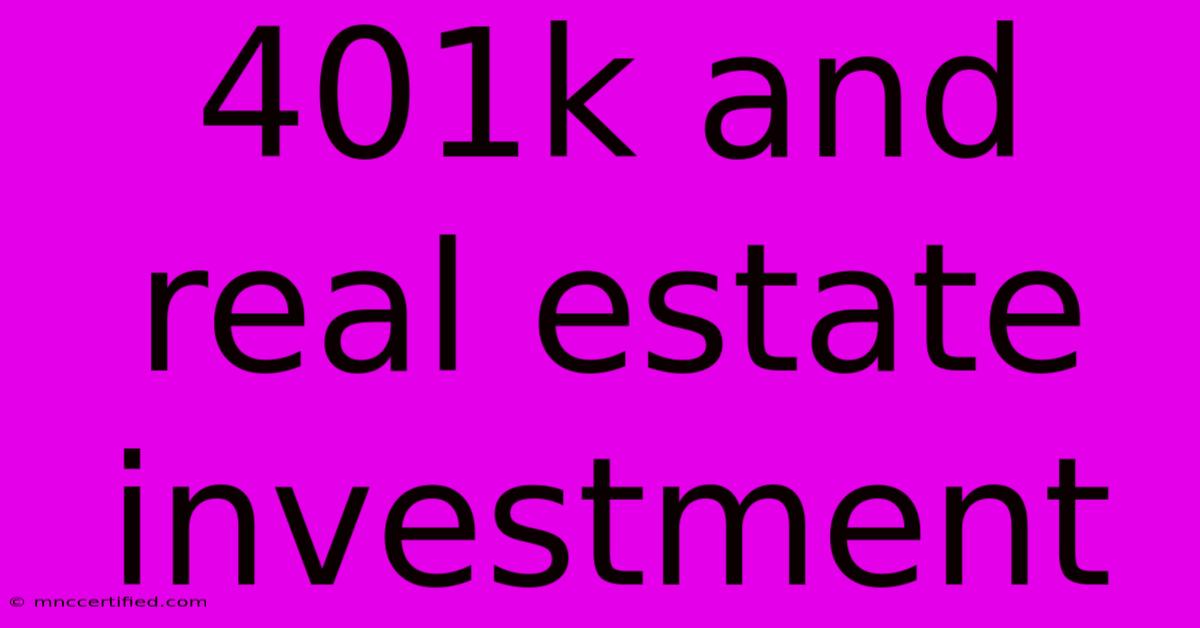401k And Real Estate Investment

Table of Contents
401(k) and Real Estate Investment: A Strategic Blend for Retirement
Investing in your future requires a multifaceted approach. While a 401(k) provides a solid foundation for retirement savings, strategically incorporating real estate investments can significantly boost your overall portfolio growth and potentially accelerate your path to financial freedom. This article explores the synergy between 401(k)s and real estate, outlining the benefits, risks, and strategies for combining these powerful investment vehicles.
Understanding the Power of Diversification: 401(k) and Beyond
Your 401(k) offers tax advantages and employer matching contributions, making it a cornerstone of retirement planning. However, relying solely on a 401(k), often limited in investment options, exposes you to market volatility. Diversification is key to mitigating risk. Real estate, with its historically strong performance and often low correlation with the stock market, presents a compelling diversification opportunity.
Benefits of Combining 401(k) and Real Estate Investments:
- Reduced Risk: Diversification across asset classes cushions your portfolio against market downturns. If stocks underperform, your real estate investments may offer stability, and vice versa.
- Increased Returns: Real estate can generate substantial returns through rental income, appreciation, and tax benefits, potentially exceeding the average 401(k) growth rate.
- Inflation Hedge: Real estate historically performs well during inflationary periods, preserving your purchasing power.
- Passive Income: Rental properties can generate a steady stream of passive income, supplementing your retirement income.
- Tangible Asset: Unlike stocks or bonds, real estate provides a tangible asset you can physically see and interact with.
Strategies for Integrating Real Estate into Your Retirement Plan:
While directly investing in real estate within your 401(k) is typically not allowed (unless your plan offers specific real estate investment options), several alternative strategies exist:
1. Investing Outside Your 401(k):
This is the most common approach. Once you've maximized your 401(k) contributions and employer match, allocate a portion of your additional savings towards real estate investments. This could involve:
- Direct Ownership: Purchasing rental properties directly. This provides maximum control but requires significant upfront capital and ongoing management.
- REITs (Real Estate Investment Trusts): REITs are publicly traded companies that own and operate income-producing real estate. They offer a relatively liquid and diversified way to invest in real estate.
- Real Estate Crowdfunding: Platforms connect investors with real estate projects, allowing participation with smaller capital commitments.
2. Self-Directed 401(k):
Some employers offer self-directed 401(k) plans, allowing broader investment choices, potentially including real estate investments. However, these require careful planning and understanding of IRS regulations. Consult a qualified financial advisor before pursuing this option.
Risks to Consider:
- Liquidity: Real estate is less liquid than stocks; selling a property can take time.
- Management: Direct ownership requires significant time and effort for property management, repairs, and tenant relations.
- Market Fluctuations: Real estate values fluctuate, and unexpected events can impact rental income and property value.
- Vacancy Rates: Periods of vacancy can significantly impact rental income.
- Tax Implications: Understanding the tax implications of real estate investments is crucial, especially regarding depreciation and capital gains.
Conclusion: A Balanced Approach to Retirement
Combining the stability of a 401(k) with the potential growth and diversification of real estate investments offers a powerful strategy for securing a comfortable retirement. However, careful planning and understanding of the risks involved are essential. Consult with a financial advisor and real estate professional to create a personalized investment plan that aligns with your risk tolerance, financial goals, and retirement timeline. Thorough research and a diversified strategy are crucial for maximizing returns while mitigating potential risks. Remember to consult with a qualified professional before making any significant investment decisions.

Thank you for visiting our website wich cover about 401k And Real Estate Investment. We hope the information provided has been useful to you. Feel free to contact us if you have any questions or need further assistance. See you next time and dont miss to bookmark.
Featured Posts
-
Mazars Investment Banking Deals
Nov 26, 2024
-
Tractor Creates Flood Wave Police Investigate
Nov 26, 2024
-
Roy Keane Ipswich Fan Altercation
Nov 26, 2024
-
Erie Insurance Prince Frederick
Nov 26, 2024
-
Db Cooper Case New Parachute Evidence
Nov 26, 2024